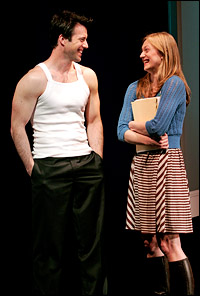
*
When he was writing his new play, Richard Greenberg felt the need to let the sun shine in. "I changed rooms," Greenberg says. "My office is very nice to look at. But it's the only room in my apartment that doesn't get natural light. I tend to write in the daytime, so retreating to it is counterintuitive. I'm not one of those cork-lined-room writers."
For a while, being in that dark room "had an influence on some of my writing. There's a sunny sitting room in front of it, and it has a writing space near the window. And I know this play is different from the play I would have written if I'd stayed in the darker room. I started in the darker room, and in the beginning the play's parameters were narrower. But once I got in the sunlight, I had this wonderful feeling of 'why not!' It gave me a kind of energy."
The play Greenberg is talking about is The Injured Party, which is having its world premiere at South Coast Repertory in Costa Mesa, CA. Set in New York in 2005, it's about, as Greenberg puts it, "a 94-year-old woman who is very wealthy and apparently immortal. She has a grandson who is not very wealthy and is filled with cravings." Or, in South Coast's words, "Her grandson, Seth, no spring chicken himself, is not-so-rich, hopelessly stalled and determined that redistribution must commence"; it's a "comedy about family, love, art, money, ambition, Christmas and — could it be? — homicide."
 |
||
| Lorenzo Pisoni and Marin Ireland in Injured Party |
||
| photo by Henry DiRocco/SCR |
Speaking about time, Greenberg has been a playwright now for more than 20 years. In 2003, his Take Me Out won the Tony Award for Best Play. He has been a finalist for the Pulitzer Prize twice, for Take Me Out and, in 1998, for Three Days of Rain. He is a winner of the Oppy Award for best new playwright and the PEN/Laura Pels Award for a playwright in midcareer. His other plays include A Naked Girl on the Appian Way, The Violet Hour and Eastern Standard.
"Mostly, I'm happy to have been through it all. I don't really teach, but every now and then I talk to classes, and that makes me aware of everything I've learned."
One thing, he says, has changed since 1985, when he had his first success in New York, a one-act play called Life Under Water, about a group that spends a summer in the Hamptons.
"When I started, I had a true careerist impulse; I had a hunger to define myself and to succeed. Every play was supposed to be instrumental in terms of my life, was supposed to do something for me. I've noticed recently that that's dwindled. I no longer expect anything to do anything for me. I don't expect it to change my reputation or make me rich or win awards.
"I like writing plays. And as far as I can tell, I still want to write plays."











